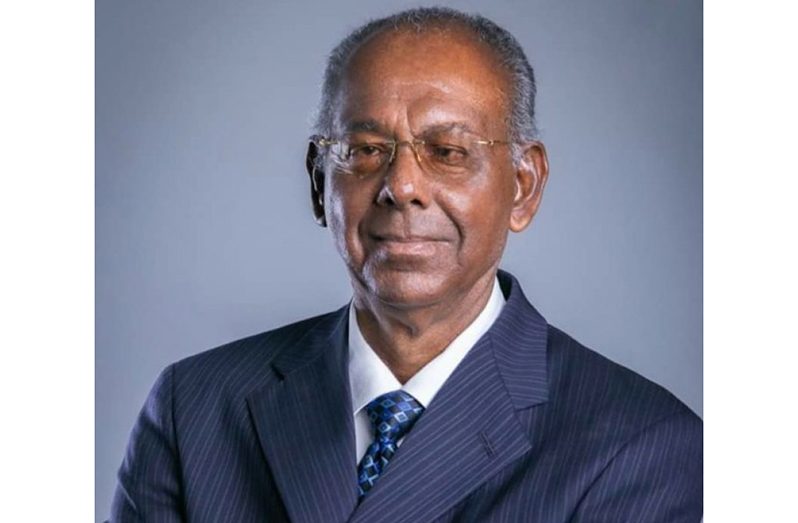THE outcome of the recent meeting between Presidents Dr. Irfaan Ali and Nicolas Maduro at the Argyle International Airport in St. Vincent and the Grenadines, can be hailed as a great victory for the people of Guyana.
This is according to Attorney-at-law Ralph Ramkarran, SC, who delved into the
outcomes of the high-stakes meeting in his latest Conversation Tree column, which he posted on his Facebook page.
In his column, he shed light on the strategic importance and implications of the Argyle Declaration following “the talks”.
The talks, facilitated by the Prime Minister of St. Vincent, Ralph Gonsalves and observed by Brazil, CARICOM, and a UN Under-Secretary-General last Thursday, were aimed at fostering peaceful coexistence, respecting international law, and avoiding the use of force.
This historic meeting culminated in what is now known as the ‘Argyle Declaration’.
Ramkarran, is no stranger to the border controversy as in 1994 he was elected as the Guyana Facilitator to the United Nations Good Officer Process under the Geneva Agreement.
In his nuanced analysis, Ramkarran highlighted the alignment of President Ali’s agenda with the Communique of CARICOM Heads issued on December 8, 2023.
Ramkarran pointed out that unity of purpose among CARICOM leaders, coupled with the unwavering commitment of President Ali, laid the groundwork for a triumphant declaration that promises to reshape the dynamics of the longstanding Guyana-Venezuela border controversy.
He pointed out that the Argyle Declaration stands as a testament to Guyana’s resilience and commitment to a peaceful resolution of the border controversy.
In the face of Venezuela’s historical claims over Essequibo, rejection of ICJ jurisdiction, and attempts to abrogate the Arbitral Award of 1899, Guyana emerged victorious by securing commitments that nullified Venezuela’s potential resort to military force.
Ramkarran, in his column, elucidated the key provisions within the Argyle Declaration, highlighting the newfound era of diplomacy and co-operation between the two nations.
He emphasised the monumental commitment made by both Guyana and Venezuela, pledging not to threaten or use force against each other, even in the wake of existing controversies.
The Declaration solidifies the commitment to resolving the controversy in accordance with international law, including the pivotal Geneva Agreement of 1966.
“Guyana succeeded in its most important objective, for which President Ali and the Guyana team must be congratulated. Venezuela’s rampaging advance towards an eventual invasion of Guyana has been dramatically halted,” he said.
President Ali’s proposed agenda, as highlighted in the Declaration and expounded upon by Ramkarran, includes a resolute defence of Guyana’s sovereignty over Essequibo, an insistence on ICJ resolution, and a call for Venezuela to respect ICJ conservatory measures.
The Argyle Declaration goes beyond merely addressing the immediate dispute; it emphasises the pursuit of good neighbourliness, peaceful coexistence, and unity throughout Latin America and the Caribbean.
Crucially, the Declaration serves as a safeguard against potential Venezuelan aggression. It mandates both nations to refrain from using force, providing Guyana with a critical deterrent against any future military adventurism by Venezuela.
“This ought to be interpreted to mean that even if the ICJ rules that the Arbitral Award is valid and binding, Venezuela is prohibited from launching any military action against Guyana,” he said.
The Argyle Declaration, as highlighted by Ramkarran, stands as a transformative document that transcends the immediate dispute.
It symbolises a commitment to regional stability and international law, showcasing the resilience and diplomatic acumen of the Guyanese leadership.
“Guyana could not have asked for a better result in the circumstances. The Argyle Declaration is a great victory for the people of Guyana,” Ramkarran said.
Earlier this month, the ICJ issued “binding” orders on Venezuela to “refrain” from taking any actions that would threaten Guyana’s sovereignty over the Essequibo territory.
In the ruling, the court ordered that, pending the decision of the substantive case, Venezuela shall refrain from taking any action that would modify the situation that currently prevails over the territory, which Guyana administers and exercises control over.
As an additional measure, the court also ordered that “both parties refrain from any action which might aggravate or extend the dispute [controversy] before the court or make it more difficult to resolve.”
Guyana had approached the World Court seeking the preservation and protection of its right to the territory awarded to it by way of the 1899 Award, pending the court’s determination of the validity of that Award.
Despite mounting calls for the Venezuelan administration to abide by international law, the Spanish-speaking country continued full speed ahead with its referendum on December 3.



.jpg)








